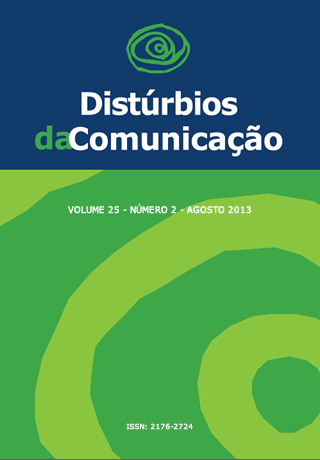Phonological working memory and phonological awareness of children with school learning difficulties
Keywords:
learning disorders, working memory, education.Abstract
To analyze the phonological working memory and phonological awareness of children with school learning difficulties. Methods: The study was conducted on 24 children of both genders aged 8 to 11 years, divided into two groups: Research Group (RG) consisting of 12 children with school learning difficulties and Control Group consisting of 12 children enrolled in public schools with no school learning difficulties. The students were evaluated by the School Performance Test, by the Test of Repetition of Meaningless Words, and by the Instrument of Sequential Evaluation (CONFIAS). Data were analyzed statistically. Results: All RG children obtained lower than normal scores in the SPT, whereas CG children obtained medium to higher scores. In the Phonological Awareness test, the scores were compatible with the presyllabic phase in 50% of RG children, with the alphabetic syllabic phase in 33.3%, with the syllabic phase in 8.3%, and with the alphabetic phase in 8.3%. In the CG, 58.33% of the children were found to have an alphabetic writing hypothesis, 25% a syllabic hypothesis, and 16.6% a syllabicalphabetic hypothesis. A significant difference (p<0.005) was observed between the two groups regarding phonological awareness skills at the syllable level and at the phoneme level, and in the total score. In the Test of Repetition of Meaningless Words, there were differences between groups (p<0.005) for the sequences of four to six syllables. Conclusion: Schoolchildren with learning difficulties showed more impairment in the phonological awareness and working memory tests compared to schoolchildren with good school performance.Downloads
Metrics
Downloads
Published
Issue
Section
License
Copyright (c) 2013 Raphaela Barroso Guedes Granzotti, Suzana Aparecida Furlan, Danielle Ramos Domenis, Marisa Tomoe Hebihara Fukuda

This work is licensed under a Creative Commons Attribution 4.0 International License.









